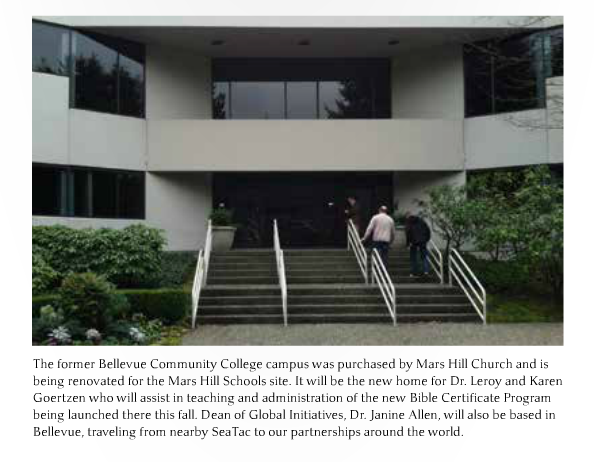On May 9, I posted a memo from Mars Hill executive pastor Sutton Turner about a plan to buy a former Bellevue College building at 10700 Northrup Way in Bellevue, WA. Mars Hill central offices will need to move by 2015 to make way for development in Seattle and so they need a new home. Originally, the leadership of Mars Hill told their congregation that God wanted them to have a property which had been purchased by Sound Transit. The church even mounted a campaign to convince the owner that the church should be there. However, something went wrong somewhere because now the church has focused on the Bellevue Community College building in Bellevue.
Recently, I learned that the planned collaboration between Mars Hill Church and two Christian colleges is slated to begin this fall in the 10700 Northrup Way property. Sources tell me that the church did not raise the $40 million requested but instead has signed a lease to use the space needed for the educational partnership. In the Spring, 2014 issue of the Corban University alumni magazine the plan to partner with Mars Hill is presented. On page 11, the picture below shows the Northrup Way property with a caption saying that Mars Hill purchased the building.

The statement that Mars Hill purchased the building is at odds with the information I am getting from inside the church. According to an analysis of rents in the Seattle area, my sources are correct. A Colliers International source says that Mars Hill leased the space.

A Mars Hill member recently told me that leadership is telling members that the church purchased the building. However, the information provided by other church sources is more consistent with the Colliers International analysis. One way or another, it appears that Mars Hill’s leadership was determined to get into the Northrup Way property. The bylaws allow the executive elders to make these moves without congregational approval. However, it is hard to understand the wisdom of making such significant move with tithes and offerings without at least informing the congregation. To be fair to MHC, perhaps the leadership has informed the people but my sources have not heard about it. I am certainly open to correction here.
Tag: Mars Hill Church
Mars Hill Church Deletes Mark Driscoll's Teaching on Jesus Making Mistakes
WMWJD?*
On May 4, Mark Driscoll preached on Acts 6:1-7. In keeping with usual procedure, the video of the sermon was not posted on the church website until yesterday.
Those who watch the sermon on the website are missing some material from the live delivery two weeks ago. A segment of nearly six minutes was deleted from the sermon after discussion internally and some questions were raised externally. I have obtained a copy of the original sermon and have the missing material here.
In question is Driscoll’s teaching on the difference between sin and mistakes. In general, the Acts 6:1-7 sermon sounds like a self-defense. However, his teaching on Jesus making mistakes was of enough concern that MHC leaders deleted it. You can watch the edited version of the sermon at the Mars Hill site. At 30:11 into the video, a nearly six minute segment was snipped out. In the video below, I start with point four, “The Difference Between a Sin and a Mistake.” The deleted section starts about two minutes into the video:
[youtube]http://youtu.be/2k4nmD0GTp0[/youtube]
Transcript:
Ok, ready, what I’m going to tell you now might be a heresy. I’m not sure. We’ll see. Ok, um, I’ll just say that, so that if it is, I have an out, ok? So, what I’m going to say now is uh, ok I’ll just say it. Jesus never sinned, will you give me that, He never sinned, true? Good, you’ve been well taught, I think. Ok, so never sinned, never violated any command of the Bible, but question, question, here goes, brain explode, ready? Here we go, is it possible that he made some mistakes?
Meaning; when he was a little kid, when Joseph sat him on his bike, he needed no training wheels, didn’t wobble, just rolled around Jerusalem. When he played Little League, if he played Little League, every time he got up, it was like, ‘Ahhh, walk ‘em! Do not throw the ball to Jesus cause he hits a home run every time! Every time he hits a home run.’ Do you think he ever hit a single? He ever hit a double? Do you think he would’ve ever swung and missed? If the ball was on the outside corner and it was a strike, maybe one time, hypothetically possibly, he didn’t swing at it.
Did he ever make a mistake? Not a sin, a mistake. Did He ever have to do something twice because he didn’t get it right the first time. When he was learning as a little kid how to write his letters, was it like, ‘I can do this, mom, I made the heavens and the Earth. Watch, I can do cursive too. Or, or, did He have to, ‘ok, this is how you make, oh, ah, ok, I got it right the second time. What do you think? What do you think? It says in Luke that Jesus grew in wisdom and stature and favor with men and God. He grew. What that means is that he had to learn how to do things. You’re going to need to learn how to do things. One of the ways we learn how to do things is we don’t get it right the first time. We fail. So then we learn from it and we figure out how to do it, that’s how we do things, right? Some of you are paralyzed by religious perfectionism. I need to get it all right, I need to get it all right the first time. You’re not Jesus. And you know what? Jesus may have learn how to do things by figuring it out, maybe not always getting it 100% right the first time.
Let me be careful with this. It’s not immoral. It’s not sinful. It’s not ungodly. It’s part of your humanity. You don’t need to repent of being human. You need to give yourself a little grace and be human. We need to give grace to one another. Otherwise you’re like one of those parents to the kid like, ‘you got it wrong!’ And the kid’s like, “and that’s how I learn. I need to try it and figure it out. So much of life is growth through mistakes, and in that category of failure, sometimes it’s a sin to be repented of, but sometimes it’s a mistake to be learned from. You get the difference?
This is why, my son’s in the middle of baseball season and track season for my daughter, we figured it out, we’ve got a hundred games with my son, and they keep raining out and rescheduling and now my son, it’s time for all-stars cause we need more games and so I was working with my 8 year old son Gideon yesterday, he’s trying out for all-stars and he, when he was in the outfield, running him in the infield, outfield, getting him ready for everything, he would push the ball and it would (made an arc motion) he doesn’t realize that he’s gotten bigger and stronger and he’s got a good arm, and he can take his crow hop and come right on over the top and he can throw the ball on a straight line from the outfield all the way into home. So yesterday we’re playing catch and Gideon pushed the ball (made arc motion) instead of throw the ball. Here’s what I didn’t say, ‘Gideon you’re in sin! When Jesus played outfield, He never had a loop on the ball. He threw it straight by the power of the Holy Spirit. You should throw it straight by the power of the Holy Spirit and repent of the pushing and looping the ball! Be like Jesus!’ I didn’t say it like that to my 8 year old son. What I said was, ‘Hey, Giddy, you know what? You’re arm’s gotten stronger, you don’t need to push the ball, you can throw it, you’re strong enough to get it all the way in on a line buddy. He needed a little coaching, a little encouragement, and he learned. That’s what life’s like. That’s what God the Father’s like. But that’s not always what religious teaching is like.
I might revisit the theology in this teaching in a future post. In the mean time, I hope my theologically inclined readers will weigh in.
I can’t help but remember that Mark Driscoll defended himself against plagiarism charges by saying “mistakes were made.” I wonder if Driscoll thinks Jesus would have made “citations errors,” yet without sin.
The textual basis for this sermon is Acts 6:1-7 where the Greek Jews were bothered that their widows weren’t getting as much care as the Hebraic Jews. We are not told in the Bible that the differential treatment was a mistake but Driscoll interprets the passage that way. From there, he contemplates Jesus as a boy doing things He never did.
The fact that Mars Hill leaders thought this passage should be removed is intriguing. Was Driscoll making an analogy to himself? It seems so because he follows this section up with a reference to leaders:
Every leader fails at something. And your failure doesn’t need to be the end of you; it could be the beginning of your learning.
Reflecting on Jesus’ humanity is a worthy theological topic but in this context, it seems like a distraction from the many calls from former members and pastors to enter into reconciliation and mediation over alleged sins, not mistakes. Former and current members don’t care much about hitting a baseball or writing in cursive. They have other concerns and deleting questionable sermon material won’t change that.
(*What Mistakes Would Jesus Do?)
Megachurch Methods: Apparently Mars Hill Global Money Can Be Spent Anywhere
Those in charge of Mars Hill Global seem to agree with me that Mars Hill Global is really Mars Hill Church.
Last week, I posted a 2011 document about the rebranding of Mars Hill Global (among other things, “cultivate an international audience and giving base”) and a slide showing the dramatic rise in giving on behalf of the MH Global brand. After those posts appeared, a sentence was added to the website description of MH Global:
Mars Hill Global has the same mission as Mars Hill Church – evangelizing, making disciples, equipping leaders, and planting churches all over the world, including but not exclusive to Ethiopia, India and the US.
The May 15 Google snapshot of the page looks like this:

The current page adds a sentence at the beginning:

My guess is that the sentence is designed to slightly better inform potential donors (remember the purpose of MH Global – “cultivate an international audience and giving base”) that the money they give to Mars Hill Global may not go to Ethiopia or India but to the general fund of Mars Hill Church.
Given the pictures of Ethiopian churches and children, some donors might think that their money was going to Ethiopia. However, according to current and former Mars Hill sources, that is not necessarily the case. This new disclosure hints that my sources are on target.
In the Mars Hill 2013 Public Disclosure package, there is no mention of Mars Hill Global, Ethiopia, India, etc., and only one mention of a mission fund:

In October 2012 alone, nearly $150,000 came in to the Mars Hill Global brand. From July, 2012 to June, 2013, nearly $2.3 million was given to Mars Hill Global. However, in available reports (the 2013 Annual Report and Public Disclosure package), where the Mars Hill Global money was disbursed is not reported.
What would be nice is Mars Hill leadership would simply indicate on the website how much money is given on behalf of Mars Hill Global and then where that money goes. In fact it would be more than nice, it would satisfy the guidelines of the Evangelical Council for Financial Accountability. The guidance is clear that reporting should make it clear where money is spent. According to the ECFA:
Historical practices of faith missions and other charities has conditioned donors to give for specific purposes and to expect their funds to be used for those stated purposes and not for the organization’s general use. Such practices include raising funds to support specific projects or programs as well as the ministry of specific workers. Fundraisers acknowledge that specific use appeals are more effective than general appeals.
Currently, I cannot find such an accounting. Last Thursday, I wrote [email protected] and asked if donations to Mars Hill Global go to missions or the Mars Hill general fund. Perhaps some accounting exists and the folks at [email protected] will let me know this week, although it is possible that the sentence added above indirectly addresses the matter.
Megachurch Methods: And By Mars Hill Global We Mean Mars Hill Local
Yesterday, I posted a Mars Hill Church document about the rebranding of Mars Hill Global as a revenue source. The document was sent out by MH Pastor Sutton Turner in 2011 to the Media and Communications Teams and began:
When it comes to giving potential, Mars Hill Church’s global audience is a sleeping giant.
Since 2011, the giant has indeed ceased from slumber. At a recent Mars Hill vision breakfast meeting, this slide was presented to the congregation:

These numbers are increasing rapidly while overall giving has been flat, and according to sources in Mars Hill, declining in recent months. In fact, the situation is troubling enough that sources tell me that the church will be approaching an entity known internally as “The Lucas Group” to help raise money. In addition, I have heard from several former staff members that the amount of Mars Hill Global money disbursed on behalf of missions outside of the United States is very low, less than 5%.
According to these sources, the rest of the funds are pooled in the general fund which is used to support administration of the Mars Hill franchises. Consistent with that claim is the fact that MHG website lists the United States as a target of Mars Hill Global. All the franchises are listed, including the churches surrounding Seattle. Reviewing the April Mars Hill Global newsletter, it looks like global is local with most of the material being about the U.S. churches.
In 2011, Sutton Turner asked if there was a better name than Mars Hill Global for the cultivation of the international giving base. I think the better name would be Mars Hill Church.
Megachurch Methods: Mars Hill Global Wakes the Sleeping Giant
Subtitle: “Mars Hill Global Cultivates the Giving Base.”
Like businesses and other organizations, megachurches like to brand things. They brand pastors (Mark Driscoll: “I am the brand!”), and brand ministries. Probably nothing really wrong with that if the brand accurately represents what is being done and offered. For Mars Hill Church, Mars Hill Global is a phrase that describes the Christian market outside of Seattle. According to the MHG web presence, Mars Hill has things going on in Ethiopia, India, and online which is everywhere else.
In addition to whatever else it is, MHG appears to be a source of funding for Mars Hill Church. In November 2011, Mars Hill Executive Pastor Sutton Turner sent a document to the Media and Communications Team touting Mars Hill Global as a way to cultivate the international “giving base.” The document is here:

Note the prime purpose for MHG is to cultivate donations to Mars Hill. The strategy involves what appears to be a lot of good things, but it is hard to escape the impression that the end game is an increase in revenue.
Mars Hill Global existed prior to this memo. However, this memo promoted a new strategy. As a part of that strategy, the Media and Communications team is urged to “Craft the Origin Story.” Everybody likes a good origin story. Perhaps Mark Driscoll really did receive letters requesting resources. But maybe he didn’t. It is hard to tell. I can’t tell from the current website what story was originally crafted.
Currently, MHG takes in about $300,000 monthly. This is a dramatic increase from when this memo was sent. Apparently, the sleeping giant is awake.